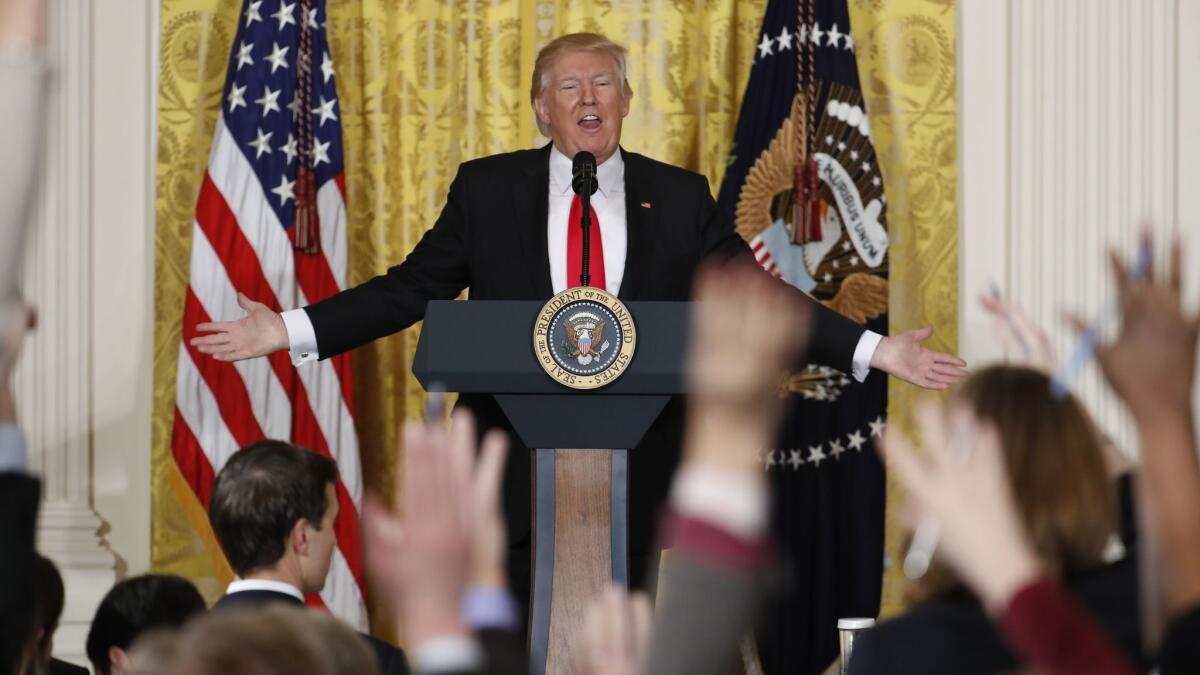Editorial: Whether populist theater or something even more nefarious, Trump’s lies have consequences

- Share via
Ten months ago, The Times editorial board wrote that Donald Trump was encouraging Americans to disrespect science, to distrust the mainstream media and to reject facts. Were this to continue, we said, the result would be an increasingly divided country with too few shared assumptions, where ideological and partisan differences would grow deeper and rational compromise would become more difficult to achieve.
The president was evidently unpersuaded by our arguments. He has continued in the intervening months to spout falsehoods, to parrot the one-sided assertions of Fox News, to recklessly belittle the scientific consensus on climate change, to encourage disagreement about matters that in the past would have been commonly accepted. On Wednesday, Trump escalated his ongoing war against the media when he unveiled his so-called “Fake News Awards” — basically a list of 10 inaccurate statements and predictions by news organizations he doesn’t like (most of which were quickly corrected at the time).
Some have argued that such behavior is merely populist theater, designed to inflame the president’s base while distracting from more serious issues. But, in fact, there are reasons to believe it should be taken more seriously.
‘Truth decay’ poses a direct threat to democracy.
Consider a report released this week by the highly respected, nonpartisan Rand Corp. The report wasn’t about Trump; indeed, he is mentioned only once in nearly 300 pages of text. But it suggests, ominously, that we are living in a period in which the line between fact and fiction is being dangerously muddied. Using examples like the large numbers of Americans who don’t believe the scientific consensus on the safety of GMO foods or vaccines or the existence of human-caused climate change — and focusing as well on the increasing distrust of formerly respected sources of factual information — the report concludes that what it calls “truth decay” poses a direct threat to democracy. Among the consequences cited by the Rand scholars: the erosion of political and civil discourse, political paralysis at the federal and state level, and increased risk of individual disengagement from political and civic life.
“Having a constructive discussion about what policies toward immigrants should look like or what objectives and outcomes policy should aim to achieve is difficult without a common set of facts — such as the number of immigrants entering the United States, the economic role of immigrants, and the level of crime perpetrated by these immigrants,” the report says. But such conversations can’t be held, the report suggests, if stakeholders are stuck arguing about the basic terms and underlying facts of the debate.
Doubt, lies, cynicism, rage, polarization and the conflation of facts with opinion — none of these are new to the American political culture; indeed the Rand report compared today’s inclement climate for truth to three other unsettled periods in U.S. history that shared many of the same troubling qualities. Among other things, the report cites name-calling, the canceling of speakers at universities, screaming matches at town halls and reduced trust in news organizations as signs of decline in the national conversation today.
Sometimes it feels as if Daniel Patrick Moynihan’s old saying that people are entitled to their own opinions but not their own facts has been turned on its head so that facts are now derived from opinions rather than the other way around. That needs to stop. America needs to reemphasize intellectual honesty, open-mindedness, logical thinking, objective truth and robust, respectful debate if it is to be a nation of shared values and shared truths.
Follow the Opinion section on Twitter @latimesopinion and Facebook
More to Read
A cure for the common opinion
Get thought-provoking perspectives with our weekly newsletter.
You may occasionally receive promotional content from the Los Angeles Times.










